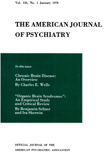LAWYERS' USE OF PSYCHIATRY
Abstract
A poll of 60 attorneys revealed that they used psychiatric consultation sparingly. Deterrents cited were expense to clients, clients' resentment at being sent to a psychiatrist, and psychiatrists' unavailability as well as lack of interest in legal matters. Most requests for psychiatric consultation were related to domestic problems, with criminal cases a distant second. Although many attorneys realize clients need psychiatric help, referrals are rarely made for purposes of treatment. Our impression is that lawyers use psychiatrists to help "the case" rather than the client.
Access content
To read the fulltext, please use one of the options below to sign in or purchase access.- Personal login
- Institutional Login
- Sign in via OpenAthens
- Register for access
-
Please login/register if you wish to pair your device and check access availability.
Not a subscriber?
PsychiatryOnline subscription options offer access to the DSM-5 library, books, journals, CME, and patient resources. This all-in-one virtual library provides psychiatrists and mental health professionals with key resources for diagnosis, treatment, research, and professional development.
Need more help? PsychiatryOnline Customer Service may be reached by emailing [email protected] or by calling 800-368-5777 (in the U.S.) or 703-907-7322 (outside the U.S.).



